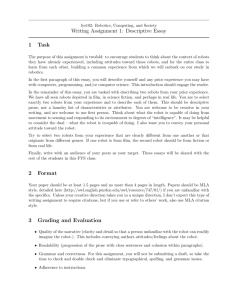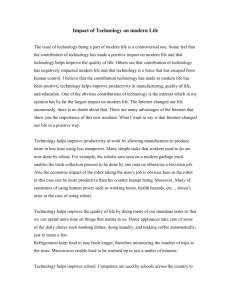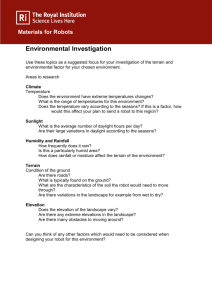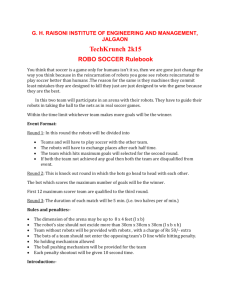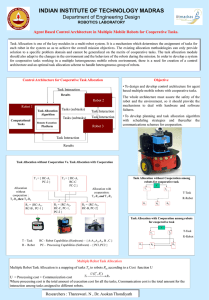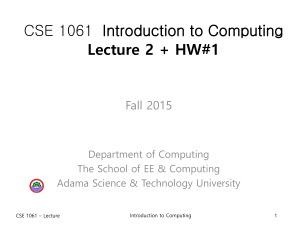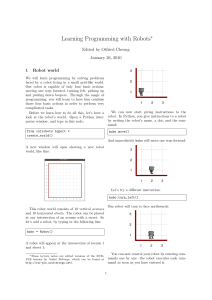lessonplan
advertisement
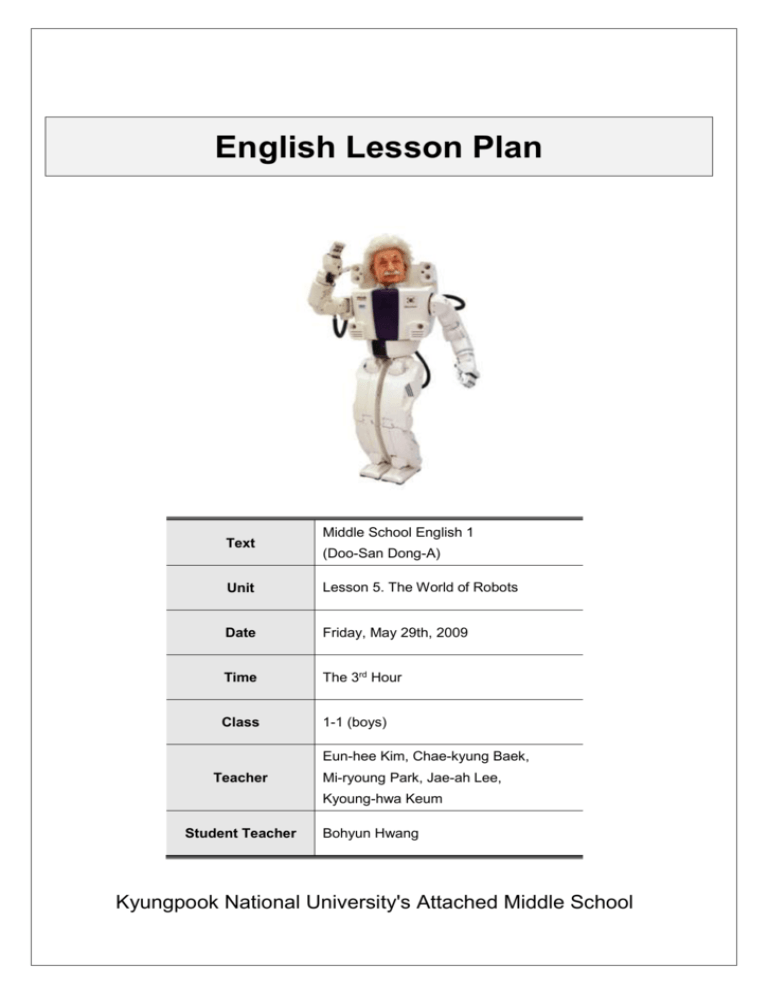
English Lesson Plan Text Middle School English 1 (Doo-San Dong-A) Unit Lesson 5. The World of Robots Date Friday, May 29th, 2009 Time The 3rd Hour Class 1-1 (boys) Eun-hee Kim, Chae-kyung Baek, Teacher Mi-ryoung Park, Jae-ah Lee, Kyoung-hwa Keum Student Teacher Bohyun Hwang Kyungpook National University's Attached Middle School Master Plan Ⅰ. Text: Middle School English 1 (Doosan Dong-A) Ⅱ. Unit: Lesson 5. The World of Robots Ⅲ. General Aims of This Lesson 1. Students will be able to use the following communicative functions. (1) Expressing possibility and impossibility A: Can you cook? B: Of course, I can. / No, I can't. (2) Complimenting A: You look very nice. B: Thank you. (3) Appreciating A: Thank you for the gift. 2. B: You are welcome. Students will be able to understand and use the following structures and expressions in real situations. (1) Structures 1) Using the auxiliary verb 'can' in declarative / negative / interrogative sentences I can play the piano. I can't play the piano. Can you play the piano? 2) Using the conjunction 'and' My sister is smart and nice. Tony can run fast and play soccer well. (2) Expressions look like ~ take pictures of~ say hi to~ shake hands with ~ do the dishes -2- Ⅳ. Time Allotment: 9 Periods (45 min. each) Period 1st Section Prepare to Read Enjoy Reading Contents & Activities ▸To skim the text and predict what the robots can do ▸To self-check the unknown words in the text ▸To read the text about the robot Albert Hubo ▸To talk about what Albert Hubo can do ▸To self-check the unknown words in the text ▸To read the text about the robots Hirobo and Aibo ▸To tell what the robots can and can’t do ▸To ask and answer the comprehension questions 2nd Enjoy Reading 3rd Enjoy Reading After You Read ▸To predict what the robot Papero can do by its appearance ▸To talk about what Papero can do ▸To match each function with the robots 4th After You Read ▸To complete the dialogue between PaPeRo and Aibo ▸To make a dialogue between Albert Hubo and Hirobo 5th Grammar in Use ▸To express ability using ‘can’ ▸ To describe a friend’s ability 6th Grammar in Use ▸ To use the conjunction 'and' ▸ To classify the words by the part of speech 7th Think and Write ▸To create a robot and its ability ▸To talk about the robot in groups 8th Project Work ▸To create a robot ▸To talk about the robot 9th Let's Check ▸To answer the questions for this lesson -3- Sub Plan Ⅰ. Date: Friday, May 29, 2009 Ⅱ. Class: The 1st of the 1st Grade Ⅲ. Unit: Lesson 5. The World of Robots Ⅳ. Period: The 5th period of 9 periods Ⅴ. Specific Aims of This Period 1. Students will be able to (1) Talk about friends’ abilities using ‘can’ and ‘can’t’. (2) Ask friends about their abilities using ‘Can you~?’ Ⅵ. Teaching Aids Computer, PPT, Projection TV, Worksheets, Video Clip, Word Cards, Flash Cards Ⅶ. Teaching Materials <Grammar in Use> Text book page 75 Robots can do many things for us Can you speak Chinese? PaPeRo can’t do the dishes. Use it 짝이 다룰 수 있는 악기에 대해 알아본 후 알맞은 것을 골라 봅시다. A: Can you play the piano? B: Yes, I can./ No, I can’t. My partner (can, can’t) play the piano. He/She (can, can’t) play the violin. He/She (can, can’t) play the danso. -4- Ⅷ. Group Arrangement Black Board Group 1 Group 6 Group 2 Group 5 Group 3 Group 4 Ⅸ. Plan for the Black Board 5. The World of Robots Objectives: Words for Students will be able to rearrangement 1. Talk about a friend’s ability using ‘can’ and ‘can’t’. 2. Ask friends about their ability using ‘Can you’. -5- Ⅹ. Summary of Teaching Process Procedures Time (min.) Greeting 1 (1) Reviewing 3 (4) PPT Motivating 1 (5) PPT Announcing the Objectives 1 (6) PPT 2.5 Video (8.5) Clip Arranging Words in Order 4 (12.5) Word Cards Practicing ‘can’ using flashcard 9.5 (22) Flash Cards Interviewing about my friends’ abilities 4 (26) Worksheet #1 Writing about my friends’ abilities 5 (31) Worksheet #2 Gallery Walk 5 (36) Steps Remarks & Aids Introduction Explaining ‘can’ Development Guess Who Evaluating Today’s Lesson 7 (43) Summarizing 1 (44) Presenting the Next Class 0.5 (44.5) Saying Goodbye 0.5 (45) Worksheet #3 Consolidation -6- PPT XI. Teaching Procedures Teaching & Learning Activities Steps Procedures Teacher Students Remarks Time & Aids (min.) Good morning, everyone. How are you today? Good morning. We have special guests I’m fine, thank you. here. They are here to see Can you say hello to them? 1 Greeting (1) They came to see Hello. studying English very hard. Can we do well? Good. Now let’s begin Yes, we can. the class. I What did we learn about in lesson five? Robots. N T R How many robots were there? Four. O D Right. Who is this? U C He is Albert Hubo. Good. He is Albert Hubo. What can he do? (T makes gesture of shaking hands) He can shake hands. T I O N Review Yes. Albert Hubo can shake hands with you. What about this one? (T presents the next slide) PPT It’s Hirobo. Right. He is Hirobo. What is special about him? (T makes gesture of strong arms.) He has strong arms. So what can he do? Good. He heavy things. can He can carry heavy things. carry -7- 3 (4) Teaching & Learning Activities Steps Procedures Teacher I Students Do you know who it is? (T shows the next slide.) It’s Aibo. Right. He is Aibo. What does he have in his eyes? He has cameras. Remarks Time & Aids (min.) N T R O D U Yes. So what can he do? Review C T S1: He can take pictures. PPT You are right. He can take pictures. The last robot. It is…? It’s PaPeRo. Yes. What can she do? S2: She can read newspapers. 3 (4) I O N You did a very good job! By the way, I went to the park yesterday, and took some pictures. (T shows the picture.) What am I doing? You are riding a bicycle. Motivating D V L O P PPT 1 (5) I can ride a bicycle very well. This is what we are going to learn today. E E Yes. Am I good at riding a bicycle? Yes. Announcing the Objectives M E N T The lesson objectives for today are first, to talk about a friend’s ability using ‘can’ and ‘can’t.’ Second, to ask friends about their ability using ‘Can you.’ Look at the screen. There is an important word. Do you see them? Yes. 1 (6) It is ‘can.’ What is it? Explaining ‘can’ PPT Right. It is ‘can.’ We can use ‘can’ to show your ability. Boys, did you know that we have very handsome movie stars in this class? No. -8- Video Clip 2.5 (8.5) Teaching & Learning Activities Steps Procedures Teacher Students (T shows the picture.) Who are the actors? Explanation of ‘can’ Remarks Time & Aids (min.) They are Jinhyun and Kiwoon. Yes, are they handsome? Yes, they are. They are very cute. When you watch the movie, see what your friends can do, and can’t do. Ok. Did you enjoy the movie? Yes. Video Clip 2.5 (8.5) Good. Now take out a word set. Now what can you do? We can make sentences. Right. You put the words together, like this. (T puts the words “Jinhyun can…” on the board.) D E V E L O P M E N T Arranging Words in Order Which group wants to try to make sentences on the board? Our group. (A group comes to the front (T checks up.) and arranges the words.) Ok, let’s see Jinhyun’s part. Did the group do well? Ok. Let’s read together. Yes. (Ss read together.) Very good. Oh, Look! There are some missing parts. What’s wrong with them? Can I put ‘carrying’ here? No you can’t. Can I put ‘cooks’ here? No you can’t. Can I put ‘played’ here? No you can’t. Can we find a rule? What is it? S1: You use base form. That’s right. We don’t -9- Word 4 Cards (12.5) Teaching & Learning Activities Steps Procedures Teacher Students Remarks Time & Aids (min.) Word 4 Cards (12.5) Flash 9.5 Cards (22) use ‘-s,’ ‘-ed,’ nor ‘-ing.’ We only use base form after ‘can.’ What about Kiwoon’s part? Did they do well? Yes. Ok. Let’s see. Where did they put ‘not’? Can I say “Not Kiwoon can dance well?” No you can’t. Can I say “Kiwoon can dance well not?” No you can’t. So did you find out the rule? Yes. D E V Arranging Words in Order E L O P M E Yes, ‘not’ comes after ‘can.’ Oh boys, you know what? ‘Can’ and ‘not’ are very good friends. ‘Not’ likes ‘can’ so much and they become one. They become what? They become ‘can’t.’ Yes. ‘can’t.’ N S1: You put ‘not’ after ‘can.’ What is it? They become T Did everyone make the sentence correctly? Yes we did. Good job boys. By the way, do you like card games? Yes, we do. Practicing ‘can’ using flash card Ok. Let’s play a card game. Take out your cards and put them down. I pick up the card. What can I do now? You make a question. Yes, I make a question -10- Teaching & Learning Activities Steps Procedures Teacher Practicing ‘can’ using flash card Students (T asks the question to a student.) Can you play soccer well like Jisung Park? S1: Yes I can. S2: No I can’t. S3: Yes I can. S4: No I can’t. I made a question and I take the card. Each person takes turns. I will give you 5 minutes. Let’s start. (Ss begin the card game.) Remarks Time & Aids (min.) Flash 9.5 Cards (22) Worksheet 4 #1 (26) Ok, boys. Look here. I shuffle the cards. I pick one card. Can anyone make a question with this? D E S1: Can you do yoga? V (T points a student.) S2: Yes I can. E Very good. Now, we are going to interview a friend. Pick a friend in your group and interview what he can do and he can’t do. I pick S1. And I interview him. S1, can you ski? S1: No I can’t. L O P M E N T Guess Inter- Who view He said “No”, so I put an X here. S1, can you play soccer? S1: Yes I can. He said “Yes, so I draw circle here. And you make two questions by yourself at the bottom. What do we do? And you make…? We pick a friend and interview him. Two questions. Yes. We make two questions. I will give you four minutes (Ss begin interviewing.) -11- Teaching & Learning Activities Steps Procedures Teacher Students Remarks Time & Aids (min.) Worksheet 5 #2 (31) Now take out your activity sheet number two. Write down about your friend what he can do and he can’t do. But do not forget. Do not write down your friend’s name. It’s a secret. It’s what? A secret. The others will guess the friend’s name. Let’s get started. (Ss begin writing.) Writing D E V Boys, can you guess who he is? He is S2. E L O P Who want to tell us about a friend? (To S1) Ok, but don’t tell us his name. (S1 presents his work.) Guess (To S1) Is he S2? S1: Yes, he is Who Oh, very good, boys. M E N T Now you put the activity sheet on the wall. You read and guess your friend’s name. And you write down his name. Boys, stand up and hold your pen. Let’s move around. I will give you two Gallery minutes. (Ss move around the Walk classroom and read their friends’ works and guess whose ability is being described.) (T picks one of the sheets on the wall and presents it to the whole class.) -12- 5 (36) Teaching & Learning Activities Steps Procedures Teacher Students Now let’s check what we learned today. You can work with your group. Evaluation C O N (Ss do their formative tests.) Is everyone done? Let’s check the answers together. (Ss check their answers.) Boys, when you want to talk about ability, you use what? ‘Can.’ Do you use ‘-ing’ with ‘can’? No, we don’t. Remarks Time & Aids (min.) Worksheet 7 #3 (43) S O L How about ‘-ed’? No. 1 Summary I (44) Do you use base forms after ‘can?’ Yes, we do. Can you ask your friend questions using ‘can’? Yes, we can. D A T I Very good. O N Presentation of the Next Next class, we will learn about the conjunction ‘and.’ Class Saying Goodbye You did very good job today. I am very proud of you. Have a nice day and see you next class. Thank you. Good bye, everyone Bye-bye -13- PPT 0.5 (44.5) 0.5 (45) -14-
